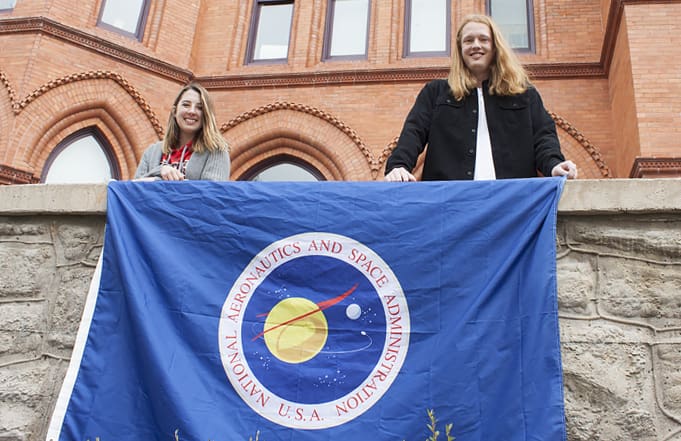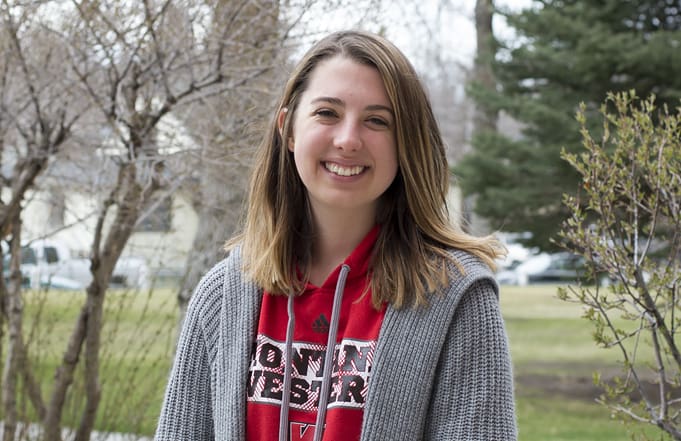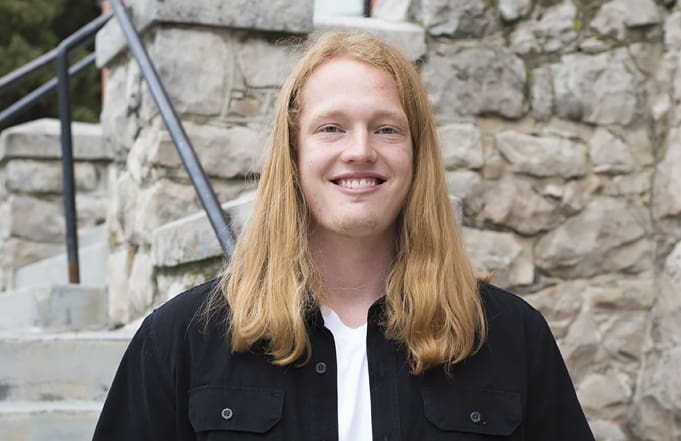May 9, 2018
Two Montana Western students are heading to NASA for the summer, where they will be participating in summer research internships at the Goddard Space Flight Center (GSFC) in Maryland.

Business Administration and Mathematics double major Baleigh Doyle will be returning to Goddard for the second summer in a row, and Business Administration major Marcus Payne will be making the journey to GSFC for the first time.
The highly competitive internships have an acceptance rate of only about 450 out of thousands of applicants.

One of Baleigh Doyle’s first tasks at Goddard Space Flight Center during her first internship was to assist with data analysis from orientation surveys designed to help people new to working at NASA. In a previous story, Doyle was interviewed about her first experience at NASA.
“I learned MATLAB in Professor Eric Wright’s Math Software course, and I came to learn to love it,” said Doyle. “I was able to take my knowledge gained at Montana Western and apply it to my internship at NASA. They are now able to process data through MATLAB more quickly and make improvements to the training process with a faster turn-around based on the survey data.”
Doyle is a team member of the Code 592 Instrument/Payload Systems Engineering Branch, a division of the Mission Engineering and Systems Analysis Division at Goddard Space Flight Center. Each team at Goddard has a code number that corresponds to their division, each with a unique focus. Code numbers range in the 100-800’s, with research projects ranging from measurement-taking rockets to the operations of the Hubble Space Telescope.
After the conclusion last summer of her first internship at Goddard through the Montana Space Grant Consortium, Doyle then received an internship in Systems Engineering with Alcyon Technical Services, a “joint venture formed between two award-winning NASA contractors” according to the ATS website.
“Because of Experience One and the block system, I was able to keep working on NASA projects for the first two blocks of the fall semester,” said Doyle. “The internship with ATS allowed me to complete two internships, one for my Business degree, and one for my Math degree at Montana Western, while gaining real-world experience.”
Baleigh plans to graduate in 2019 and is excited for what the future holds. Already applying for jobs, she feels the small class sizes and one course at a time format that Montana Western offers prepared her for working at NASA.
“Experience One allows you to learn how to work in teams, and how to produce work efficiently and quickly. My team at NASA was impressed by how quickly I could jump in and start contributing right away,” said Doyle.

A native of Livingston, Mont., Marcus Payne is a Business Administration major with a focus on marketing who graduated this spring.
Working closely with Professor Fred Chilson, Payne applied seven months ago for the exciting opportunity.
“I think the intense and focused environment at Montana Western helped me grow my teamwork skills, and is more conducive to an actual work environment,” said Payne.
During the course of Payne’s business marketing internship, he will work in the NASA Goddard Space Flight Center’s Strategic Partnerships Office. According to its website, “the Strategic Partnerships Office is a connector – forging innovative partnerships that link NASA researchers at Goddard Space Flight Center (internal inventors) with corporations, startups, universities, and other government agencies (external partners).”
Payne will research and plan strategic partnership opportunities between small and large businesses who may be interested in technology transfer, licensing opportunities, and/or partnership opportunities using NASA Goddard technology.
He will also create business plans and assist with Regional Economic Development initiatives and the OPTIMUS PRIME Spinoff Promotion and Research Challenge (OPSPARC) awards ceremony and workshop.
According to its website, the OPSPARC competition asks students to “use their imagination and creativity to identify NASA Spinoff technology in their everyday world. Items such as memory foam, invisible braces, firefighting equipment, artificial limbs, scratch-resistant lenses, aircraft anti-icing systems, shoe insoles, water filters/purification, cochlear implants, satellite television, and long-distance telecommunications were first developed for a NASA mission and then, re-worked to make everyday life easier.”
Students in grades 3-12 display their research in a multimedia poster that is submitted and shared with NASA. The OPSPARC winning teams or individuals will receive a stipend to visit Goddard Space Flight Center for two days of hands-on workshops with astronauts and scientists. Marcus will assist with the award ceremony and workshop portion of this exciting competition for students across the United States and Canada.
“I’m really excited, and I’m sure I will learn so much from this experience,” said Payne.